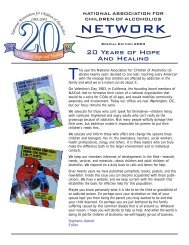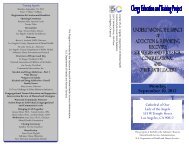Contents - NACoA
Contents - NACoA
Contents - NACoA
Create successful ePaper yourself
Turn your PDF publications into a flip-book with our unique Google optimized e-Paper software.
Children of alcoholics may benefit from adult efforts which help them to:<br />
Develop autonomy and independence.<br />
Develop a strong social orientation and social skills.<br />
Engage in acts of “required helpfulness.”<br />
Develop a close bond with a caregiver.<br />
Cope successfully with emotionally hazardous experiences.<br />
Perceive their experiences constructively, even if those experiences cause pain or<br />
suffering; and gain, early in life, other people’s positive attention.<br />
Develop day-to-day coping strategies.<br />
Children can be protected from many problems associated with<br />
growing up in an alcoholic family.<br />
If healthy family rituals or traditions (such as vacations, mealtimes,<br />
or holidays) are highly valued and maintained; if the active<br />
alcoholic is confronted with his or her problem; if there are<br />
consistent significant others in the life of the child or children;<br />
and if there is moderate to high religious observance—then<br />
children can be protected from many of the consequences<br />
of parental alcoholism.<br />
Maternal alcohol consumption during any time of pregnancy can cause<br />
alcohol-related birth defects or alcohol-related neurological deficits.<br />
The rate of drinking during pregnancy appears to be increasing.<br />
Prenatal alcohol effects have been detected at moderate levels of alcohol consumption<br />
by non-alcoholic women. Even though a mother is not an alcoholic, her child<br />
may not be spared the effects of prenatal alcohol exposure.<br />
Cognitive performance is less affected by alcohol exposure in infants and children<br />
whose mothers stopped drinking in early pregnancy, despite the mothers’ resumption<br />
of alcohol use after giving birth.<br />
One analysis of six-year-olds, with demonstrated effects of second-trimester alcohol<br />
exposure, had lower academic achievement and problems with reading, spelling,<br />
and mathematical skills.<br />
17





